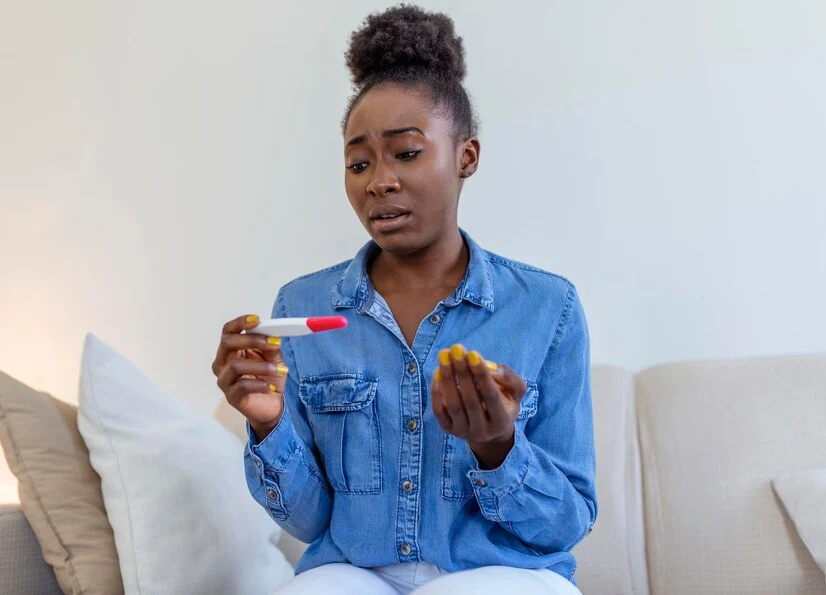
Can You Get Pregnant During Your Period? Let’s Set the Record Straight
It’s one of those questions many women have but feel too embarrassed to ask: Can you get pregnant during your period? With all the myths and misconceptions surrounding menstruation and pregnancy, it’s easy to feel confused or unsure. If you’ve heard differing opinions or gotten mixed messages, don’t worry—you’re not alone.
In this post, we’ll dive into the facts, debunk the myths, and answer this important question once and for all. It’s time to get the facts and not just the stories.
The Truth About Getting Pregnant During Your Period
First, let’s make one thing clear: Yes, Pregnancy during your period is possible, but it’s not common. Here’s why:
1.The Menstrual Cycle and Ovulation
Typically, a woman’s menstrual cycle lasts around 28 days, but it can vary from person to person. Ovulation, the release of an egg from the ovary, usually occurs about 14 days before the next period. For women with regular cycles, pregnancy is most likely to occur if sperm meets egg during this ovulation window. But here’s where things get tricky:
2.Sperm Can Live for Up to 5 Days
Sperm can survive inside the female reproductive tract for up to 5 days. So, if you have sex toward the end of your period and you ovulate early (before the 14-day mark), the sperm could still be viable when your egg is released. If that happens, pregnancy is possible.
3.Short Cycles and Irregular Periods
For women with shorter cycles (for example, a 21-day cycle) or irregular periods, ovulation can occur shortly after their period ends. In this case, sperm from intercourse during menstruation could meet the egg, leading to pregnancy.
Common Misconceptions About Pregnancy d Periods
Many myths circulate about menstruation and pregnancy, including those surrounding the possibility of pregnancy during your period. Let’s break down a few of the most common misconceptions.
- You can’t get pregnant during your period.
As we mentioned earlier, it is possible, but it’s less likely. Many people assume that there can be no occurrence of pregnancy during your period, but that’s not always the case, especially if your cycle is unpredictable. It’s important to remember that while pregnancy during your period is rare, it’s not out of the realm of possibility. The timing of ovulation plays a critical role in this, and many women don’t always track their cycles with precision. If you have an irregular cycle or shorter menstrual phases, the chances of pregnancy during your period increase. The sperm that remains viable for up to five days could potentially meet the egg soon after ovulation if you’re having intercourse during menstruation. So, it’s essential to be aware of your cycle and consider using protection during your period, just in case. - If you have unprotected sex during your period, you’re safe from pregnancy.
This is not always true. While pregnancy during your period is less likely, it’s not impossible, especially for women with shorter or irregular cycles. Don’t assume that you’re safe from pregnancy just because you’re bleeding. - Period blood prevents sperm from reaching the egg.
While menstrual blood does not directly prevent sperm from reaching the egg, the cervical mucus during your period might actually facilitate sperm movement. In fact, it can provide an environment that helps sperm survive longer.
Tips for Getting Accurate Information and Avoiding Misconceptions
It’s easy to fall for myths and stories passed around by friends, family, or even the internet. But when it comes to reproductive health, getting accurate, science-backed information is essential. Here are a few tips for finding the truth:
- Trust Reliable Sources
When it comes to understanding menstruation and pregnancy, seek out trusted and evidence-based resources, such as healthcare professionals, reputable medical websites, or organizations like the American Pregnancy Association or the Mayo Clinic. - Consult with a Doctor or Gynecologist
If you have specific questions or concerns about your cycle, ovulation, and pregnancy, the best person to talk to is a healthcare professional. They can help you understand how your cycle works and address any questions you may have. - Learn About Your Cycle
Tracking your menstrual cycle can help you understand your own body better. Using apps or keeping a journal to note your period dates, ovulation, and other symptoms can provide insight into when you’re most fertile. This will help you make informed decisions about pregnancy prevention and overall reproductive health. People can get pregnant at any time during their menstrual cycle, though pregnancy during your period is much less likely. However, it is still important to understand that pregnancy during your period is possible, especially if you have irregular cycles or a short luteal phase. - Don’t Rely on Word of Mouth
While it’s great to have conversations with friends, remember that not all stories you hear are rooted in fact. What worked (or didn’t work) for someone else may not apply to your body or your cycle. Focus on scientifically proven facts and avoid relying on rumors. pregnancy during your period is often a topic surrounded by confusion, especially when relying on old myths or incorrect information. While it’s less likely, it’s not impossible. If you’re sexually active and looking to avoid pregnancy, understanding your cycle and using contraception consistently is key. Even though pregnancy during your period may not be common, it’s always best to err on the side of caution by taking preventive measures, such as using birth control or condoms. Education and awareness are crucial in making informed decisions about your reproductive health.
Preventive Measures: How to Protect Yourself
Regardless of when your period falls, to avoid pregnancy during your period, especially if you’re not trying to get pregnant, it’s important to use contraception consistently and correctly. Here are some preventive measures to consider:
- Contraceptive Methods
Using condoms, birth control pills, IUDs, or other forms of contraception significantly reduce the risk of pregnancy during your period. These methods work by preventing ovulation, blocking sperm, or making the environment in your uterus less hospitable to a fertilized egg. - Know Your Fertility Window
Even though pregnancy during your period is unlikely, it’s not impossible. If you’re sexually active and want to avoid pregnancy, understanding your fertility window is key. The fertility window typically occurs around 5 days before ovulation and 1 day after ovulation. Use this knowledge to plan accordingly and use protection if needed. - Emergency Contraception
If you’ve had unprotected sex and are worried about pregnancy, there are options like Plan B (emergency contraception) that can reduce the risk of pregnancy if taken within a certain timeframe. Always consult with a healthcare provider for guidance on emergency contraception. - Use Protection Every Time
It’s always a good idea to use protection to reduce the risk of sexually transmitted infections (STIs), especially if you’re unsure of your partner’s sexual health status. Using condoms consistently can protect against both unwanted pregnancies and STIs.
Let’s Normalize These Questions and Conversations
As women, we need to feel comfortable asking questions about our bodies and reproductive health without judgment or shame. Whether it’s about pregnancy, menstruation, or contraception, it’s important to seek knowledge and make informed decisions.
It’s perfectly okay to ask questions like, “Can I get pregnant on my period?” because these questions matter. Understanding your body empowers you to make better choices for your health, happiness, and future. Remember, asking questions, seeking accurate answers, and making informed choices is how we take control of our reproductive health.
Conclusion
Knowledge Is Power: In the end, understanding your menstrual cycle and reproductive health is key to making informed decisions about pregnancy prevention. While pregnancy during your period is not common, it’s still possible. That’s why it’s important to always consider contraception and to seek accurate, reliable information when you have questions about your body.
You are in control of your health. Never be afraid to ask questions, get the facts, and make choices that are right for you. For more information, locate our Blog Section.
All Categories
Recent Posts
Why SDG 4 Cannot Be Achieved Without Ending Period Poverty
Tags
Give them a helping hand
Every donation fuels our mission to combat period poverty. Your generosity brings us closer to menstrual equity.
+234-909-482-1642
inquiries@blossomflow.org




